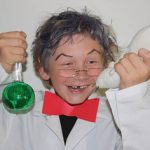 A shortage of STEM related skills is common around the world, and so governments are striving to get children interested in studying science, maths and computing. A recent study from New York and Princeton universities highlights some of the challenges involved. It reveals that children are much more confident that they can ‘do science’ than they are that they can ‘be scientists’.
A shortage of STEM related skills is common around the world, and so governments are striving to get children interested in studying science, maths and computing. A recent study from New York and Princeton universities highlights some of the challenges involved. It reveals that children are much more confident that they can ‘do science’ than they are that they can ‘be scientists’.
What’s more, this belief carried on into their views of adults, as they believed many more adults were capable of doing science than they thought could be scientists. It suggests that young people generally have a pretty inclusive view on who can do science whilst at the same time having stereotypes about who can be a scientist.
The researchers quizzed over 300 elementary-school children in the Brooklyn and Bronx areas of New York over the course of the school year. The children were reflective of the racial makeup of their local community and were split evenly between boys and girls.
“Studying a more diverse population is crucial if we want to understand and ensure efforts to improve science engagement work for everyone,” the authors explain. “That we see similar effects across children of different backgrounds in these communities suggests that using action-focused language could be a promising strategy to help a large number of children stay engaged in science.”
Focusing on actions
The team aimed to test the interest and self-efficacy in science for each child three times during the course of the year. Half of the children were asked how keen they were to become a scientist and also how good they thought they were at science. The other half were simply asked how good they were at doing science.
Interestingly, over the course of the school year, children’s confidence and interest in being a scientist typically declined, whereas their confidence in their scientific abilities generally endured throughout the year.
They then dug deeper to try and understand what underpinned these findings. They asked the children how they see people who do science, and how they see those who are scientists. The children were asked to think of all of the parents of other children at their school, and calculate how many of them either were scientists or did science. The results suggest the children think far more people do science than actually were scientists.
“These finding suggest that using identity-focused language with children, such as asking them to ‘be a scientist,’ can, in fact, backfire whenever children have reason to question if they are really a member of the group,” the authors explain. “Such reasons to question can come from social stereotypes–such as a belief that few people from a child’s community can grow up to be a scientist.”
The findings suggest that a seemingly insignificant change in how we talk about science with children can have an impact in sustaining their interest in science, and hopefully encouraging more to do science as adults.